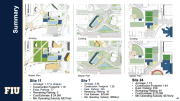Madison Fantozzi/News Director
Members of the American Studies Association recently voted to honor the call of Palestinian civil society to boycott Israeli academic institutions — a resolution the University has publicly opposed.
President Mark B. Rosenberg and Provost and Executive Vice President Douglas Wartzok authored a University-wide email on December 26 in response to the ASA’s action.
“We support research and scholarly dialogue among all scholars including full participation of Palestinian as well as Israeli academics,” the email read.
The 5,000-member national organization dedicated to the interdisciplinary study of American culture and history says it supports a boycott of Israeli academic institutions given that the institutions are “complicit in the multi-tiered system of oppression that has denied Palestinians basic rights.”
More than 1,250 ASA members voted on the boycott proposal and over 66 percent supported the resolution.
The ASA claims Israel’s academic institutions have a direct partnership with the military, citing cases like Tel Aviv University’s development of weapon systems and Safed Academic College’s ban on Palestinian students running for student government office.
Wartzok said the ASA should not protest the lack of academic freedom for one group by taking it away from another.
“Progress toward solving difficult issues such as this one will be achieved only when the academic freedom of all scholars is preserved and enhanced,” Rosenberg and Wartzok wrote in their email.
Nathan Katz, distinguished professor in the School of International Relations and Public Affairs, agrees.
[pullquote]“I’m proud of the University for making its statement,” Katz said. [/pullquote]“There’s this huge academic backlash and the list of opposing institutions is growing everyday.”
FIU joins Harvard, Yale, Boston University, University of Florida and University of Miami in opposition.
Katz outlined three reasons opposing the boycott, citing the importance of communication, the concern of discrimination and the academic strength of Israel’s institutions.
“For one thing, academic boycotts are a bad idea because conflict means we should speak more, not less,” Katz said. “Shutting off universities means closing off that communication.”
The ASA will not allow representatives or ambassadors of Israeli academic institutions including deans, rectors and presidents, to participate in conferences or public lectures. The association will not participate in conferences or events sponsored by Israeli universities either.
“You can’t regulate communication between institutions just like you can’t regulate two people,” Katz said. “Breakthroughs are made at these conferences and they are needed to generate research.”
Katz also feels Israel is being singled out.
“There’s no boycott against Syria or Tibbett,” Katz said. [pullquote]“I’m nervous about the motivation.”[/pullquote]
Katz said Israel’s institutions are crucial to academia.
“The boycott would shut off crucial, important research in areas like aerospace and agriculture,” Katz said. “We need Israeli institutions.”
While ASA’s boycott targets institutions and their representatives, it said it will not regulate individual scholars, students or workers. While the organization will not collaborate with Israeli academic institutions, it said the boycott will not curtail dialogue between American and Israeli scholars.
Still, academia opposes.
And while FIU is not a member of the ASA, Penn State University at Harrisburg and Brandeis University have withdrawn their memberships.
“If you call for a party and no one comes, that’s not a party. If there’s a call for a boycott and no one joins then there’s no boycott,” Katz said. “I hope the boycott is ignored and it becomes meaningless.”
– madison.fantozzi@fiusm.com






Be the first to comment on "University opposes boycott of Israeli academic institutions [UPDATE]"